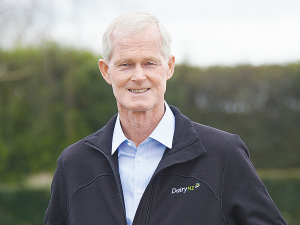DairyNZ opens applications for associate director role
DairyNZ is giving New Zealand farmers a unique opportunity to gain hands-on governance and leadership experience within the dairy sector.
 DairyNZ chair Jim van der Poel says every Kiwi is benefitting from dairy's contribution to our country.
DairyNZ chair Jim van der Poel says every Kiwi is benefitting from dairy's contribution to our country.
The dairy industry's total economic contribution to New Zealand's economy topped $40 billion last season.
DairyNZ chairman Jim van der Poel revealed this at the industry-good body's annual general meeting last week.
He told the online AGM that he is proud of farmers' contribution to the economic wellbeing of the country.
The contribution was helped by a high milk price by all processors to their suppliers.
Van der Poel noted the role dairy still plays in New Zealand's economy as Covid-19 continues to affect communities.
"Every Kiwi is benefitting from dairy's contribution to our country.
"Covid-19 has also affected farmers beyond the farm gate, exacerbating staff shortages. DairyNZ has been strongly advocating for immigration policy changes to help address this issue.
"We were pleased to see that thousands of dairy workers can now apply for residency, following some hard work by DairyNZ, Federated Farmers and farmers to push the urgency of migrant workers being able to settle in New Zealand."
Van der Poel noted that the last season was a challenging one for many farmers.
He also shared the good news that perception of dairy farmers among New Zealanders was improving.
DairyNZ's Vision is Clear campaign profiled 60 farmers over the last three years, showing what they have done for the environment.
Some 1.7 million Kiwis saw the campaign and an estimated 63% of Kiwis who have seen the campaign feel positively towards dairy farmers, said van der Poel.
"When the campaign started in 2018, only 43% of New Zealanders felt that way," he says. "We have seen a big change in only three years."
The chair also touched on the success of the Mycoplasma bovis eradication campaign.
"As a result of hard work by farmers and partner organisations, we are also winning the M. bovis battle," he says.
By October 2021 only two farms in New Zealand had active M. bovis - down from 34 two years ago.
"We know that M. bovis has created a significant amount of stress for farmers, and we have been focused on working with programme partners to improve biosecurity and farmer support," he says.
In his brief report, DairyNZ chief executive Tim Mackle touched on a few highlights, including a DairyNZ-commissioned AgResearch report released in January that found New Zealand dairy farmers have the world's lowest carbon footprint - at half the emissions of other international producers.
"We shared this story widely with media and politicians, ultimately reaching an estimated 3.4 million people. This position is a great starting point but also a challenge for us going forward as we navigate how to reduce our emissions even further," said Mackle.
Major projects being run by DairyNZ include a genomic selection research programme on developing higher yielding pastures with a lower environmental footprint.
Mackles says this has the potential to improve yields by between $400 million to $1.3 billion annually by 2040.
Researchers are also making good progress in using genetics to predict cow fertility through puberty timing.
This could enable farmers to breed more fertile herds and deliver environmental benefits, through fewer stock on farms, he says.
More farmers are adopting flexible milking to create a better lifestyle or to manage staff shortages. This shift is also proving to have animal health benefits.
DairyNZ has been trialling cows being milked three times in two days as opposed to being milked twice a day.
Mackle says one trial herd showed a 5% drop in milksolids production compared to milking twice a day but cows were in much better condition.
The World Wide Sires National All Day Breeds Best Youth Camp Best All Rounder plaudit has become family affair, with 2026 Paramount Cup winner Holly Williams following in her sister Zara's footsteps.
DairyNZ is giving New Zealand farmers a unique opportunity to gain hands-on governance and leadership experience within the dairy sector.
Herd improvement company LIC has posted a 5.2% lift in half-year revenue, thanks to increasing demand for genetics.
According to the latest Fresh Produce Trend Report from United Fresh, 2026 will be a year where fruit and vegetables are shaped by cost pressures, rapid digital adoption, and a renewed focus on wellbeing at home.
The Roar is a highlight of the game hunting calendar in New Zealand, with thousands of hunters set to head for the hills to hunt male stags during March and April.
OPINION: The past few weeks have been tough on farms across the North Island: floods and storms have caused damage and disruption to families and businesses.
OPINION: Fonterra may be on the verge of selling its consumer business in New Zealand, but the co-operative is not…
OPINION: What does the birth rate in China have to do with stock trading? Just ask a2 Milk Company.